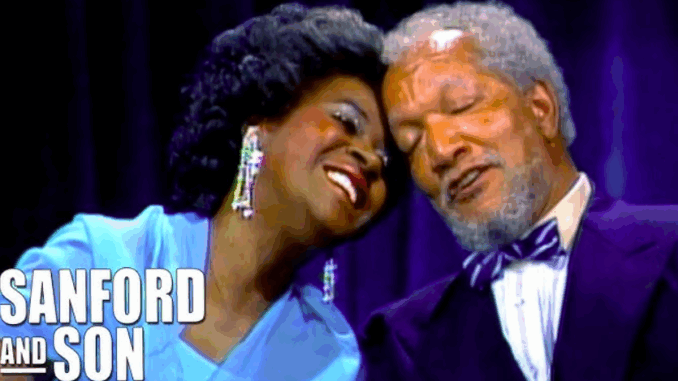
She stormed into Fred Sanford’s house like a holy hurricane, Bible in one hand and a verbal slap in the other. With every “Watch it, sucka!” and “Heathen!” Aunt Esther became one of the most unforgettable characters on Sanford and Son. But she was more than just comic relief—she was a symbol of resistance, pride, and the untamed fire of a woman who would not be silenced.
Played by LaWanda Page, a veteran of the Black comedy circuit, Aunt Esther broke every mold in 1970s television. She was loud, devout, hilarious, and unafraid to go head-to-head with Fred Sanford. And in doing so, she became one of the most important side characters in sitcom history.
From Chitlin’ Circuit to Primetime TV
LaWanda Page had been hustling for years before Sanford and Son. A comedian in raunchy nightclubs, she was known for her blue humor—long before she played the God-fearing Esther. She was part of the “Chitlin’ Circuit,” a network of clubs and theaters that catered to Black audiences during segregation.
It was Redd Foxx, her longtime friend and fellow comic, who fought for her to be cast. NBC execs were skeptical at first, but Foxx insisted. He knew what Page could bring to the table.
And she didn’t disappoint. From her very first appearance in Season 2, Aunt Esther made audiences laugh—and listen.
The Righteous Flame
Esther Anderson, Fred’s sister-in-law, was a Bible-thumping, quick-tempered force of nature. She didn’t just scold Fred—she challenged him. She saw through his cons. She called out his hypocrisy. And she always came back swinging.
Their dynamic was pure gold: Fred, the schemer, always ready with a jab. Esther, the avenger, armed with Scripture and sass. It was war, and viewers couldn’t get enough.
“Look here, Esther,” Fred might growl, “you so ugly, I could stick your face in some dough and make gorilla cookies.”
“Don’t you talk about me, you old fish-eyed fool!” Esther would roar, Bible held high like a weapon.
Their verbal duels were rooted in love, but they also mirrored something deeper—generational tension, religious conviction versus streetwise survival, and the unspoken pain of a family fractured by time and poverty.
More Than a Stereotype
At first glance, Aunt Esther could be mistaken for a caricature: the angry Black church lady with a grudge. But LaWanda Page made her real. She infused the character with strength, heart, and a kind of dignity that refused to be mocked.
Esther wasn’t just righteous—she was respected. She took care of family. She stood up for her beliefs. She was the only person who could make Fred back down without ever throwing a punch.
Page said in interviews that she drew inspiration from women in her own life—women who “held the family together” with a mix of hard love and hard prayer.
In an era when Black female characters were rarely more than sidekicks or maids, Aunt Esther stood alone.
Esther in the Bigger Picture

Esther’s presence brought something to Sanford and Son that few sitcoms had: a strong, older Black woman who was neither passive nor background noise. She didn’t just react to Fred’s antics—she dominated the scenes.
She also introduced religious themes into the show in ways that were both comedic and sincere. Esther was funny, but she also spoke to the deeply rooted faith of many Black American households. Her character reflected the Black church’s influence and the women who held communities together through their leadership in faith.
Even when Esther’s methods were aggressive, her motivation was often love. She cared about Lamont’s well-being. She believed Fred could be better (even if she didn’t hold her breath). That combination—fiery insults with genuine heart—gave her depth that few sitcom characters enjoy.
Why We Still Love Aunt Esther
Over time, Aunt Esther became so popular that she was given episodes centered around her own storylines, including ones where she adopted a child or tried to start her own church. Audiences cheered whenever she marched through the Sanford home, ready to unleash her latest sermon.
And yet, Esther never overshadowed the show. Instead, she balanced it.
If Fred was the wild id of the series—selfish, scheming, and outrageous—Esther was the moral compass, however exaggerated. She reminded viewers that even in a sitcom, some things still matter: faith, family, and fighting back when you’re disrespected.
LaWanda Page’s Lasting Impact
LaWanda Page continued performing long after Sanford and Son ended. She remained a legend in the stand-up world and appeared in shows like Amen, 227, and even Martin, where younger audiences embraced her sharp tongue all over again.
But Aunt Esther is her most lasting legacy.
In 2024, more than 50 years after Sanford and Son debuted, you can still find clips of her online—young fans discovering her fire, her voice, and her refusal to be ignored. She paved the way for characters like Madea, Roz from Frasier, and even Donna Meagle from Parks and Recreation—women who own the room, speak their mind, and never apologize for it.
Final Thoughts
Aunt Esther may have entered the show as a foil for Fred, but she ended up as its most unshakable pillar. Through laughter, fire, and faith, she reminded us that the fiercest love sometimes comes wrapped in the harshest words—and that true strength never needs permission to speak.